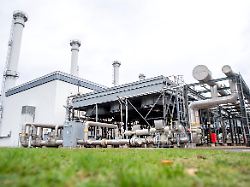Facilities are already full
Gas storage facilities reach interim target much earlier than planned
6/2/2023 1:12 p.m
German gas storage facilities have reached an important interim goal much earlier than expected. This gives hope that they will be 100 percent full again next winter. The Federal Network Agency also praises the federal government for its actions over the past year.
The natural gas storage facilities in Germany have reached the first storage target for the coming heating period of 75 percent fill level – three months earlier than planned. According to the European gas storage association GIE, they were 74.97 percent full on the morning of June 1st. The 75 percent mark was introduced last summer during the gas crisis in a new gas storage ordinance as an interim target for September 1st. According to this, the storage facilities should be 85 percent full by October 1st and 95 percent by November 1st. The levels have been increasing every day since May 4th.
The lowest fill level of the current year so far was recorded on March 17 at 63.58 percent. A year earlier, on March 17, 2022, German storage facilities were only 24.56 percent full. The largest German storage facility in Rehden, Lower Saxony, which was controlled by the Russian state-owned company Gazprom until the beginning of April 2022, was a good 88 percent full on Thursday morning. EU-wide the fill level was almost 69 percent.
The storage facilities compensate for fluctuations in gas consumption and thus form a buffer system for the market. In winter, the fill levels usually decrease. From the end of March/beginning of April, more is usually stored than withdrawn. On the morning of November 14, 2022, a filling level of 100 percent was recorded in Germany.
Federal Network Agency considers action last year to be justified
In retrospect, the Federal Network Agency considers the federal government’s strategy for state gas procurement to be justified during the energy crisis last year. “It was right that we acted quickly last summer and did everything we could to fill the gas storage tanks for the winter,” said Bundesnetzagentur boss Klaus Müller.
As a result of the Russian attack on Ukraine and the gradual failure of Russian gas deliveries, the federal government had made the filling of the gas storage tanks a legal requirement and bought large quantities of gas itself through the company Trading Hub Europe (THE). The purchase program amounted to almost one billion cubic meters, and THE was provided with a credit line of 15 billion euros.
But there was criticism of the program. On the one hand, the supply situation was at no time remotely endangered throughout the winter – the question arose as to whether expensive state gas procurement was necessary.
Looking ahead, Müller explained that it currently looks as if no state intervention will be necessary to fill the storage tanks this year. “Nevertheless, if storage were to be initiated by the state, further optimization options would be available today in dealing with the storage volumes.”
